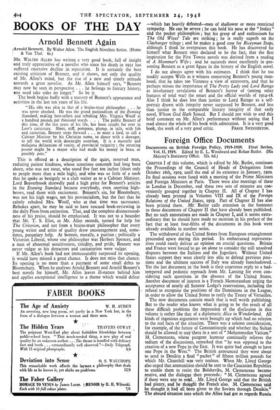BOOKS OF THE DAY
Arnold Bennett Again•
r Arnold Bennett. By Walter Allen. The English Novelists Series. (Home I & Van Thal. 6s.)
Mu. WALTER ALLEN has written a very good book, full of insight and truly appreciative of a novelist who since his death in 1931 has suffered excessive decline in reputation. It is certainly the best existing criticism of Bennett, and it shows, not only the quality of Mr. Allen's mind, but the rise of a new and timely attitude towards a great novelist. As Mr. Allen himself says, "Bennett may now be seen in perspective . . . le belongs to literary history, erne need take sides no longer." So be it.
The book begins badly with a travesty of Bennett's appearance and activities in the last ten years of his life.
"His role was akin to that of a brains-trust philosopher . . . he was never abashed. He was the grand panjandrum of the Evening Standard, making best-sellers and rebuking Mrs. Virginia Woolf at a hundred pounds per thousand words. . . . The public Bennett of this time, of the last years of his life, has been caught for ever in Low's caricature. Short, stiff, pompous, plump, in tails, with fob and carnation, Bennett steps forward . . . to meet a lord, to call a Cabinet Minister by his Christian name, to dance with a dowager, to tell the world with downright assertion. It is a masterly and malicious delineation of vanity, of provincial vulgarity ; the strutting poseur might be a mayor who had made his money in brass or possibly pots."
This is offered as a description of the quiet, reserved man, radiating patient kindness, whose notorious coxcomb had long been shorn, who was not stout, who stood five feet ten inches (short only to people more than a mile high), and who was so little of a snob that he spoke as benignly to a club waiter as to a Cabinet Minister. Lord Beaverbrook shrewdly paid a high price for Bennett's articles in the Evening Standard because everybody, even snorting high- brows, read them with excitement. Bennett's sin, for Bloomsbury, was not his high wages, not his provincialism, but the fact that he calmly rebuked Mrs. Woolf, who at that time was sacrosanct. Rebukes apart, he may be said to have rescued book-reviewing in the daily Press from extinction. That, and the complete disinterested- ness of his praise, should be emphasised. It was not to a bounder that Mr. T. S. Eliot, as Mr. Allen records, turned for help for The Criterion, and not from a brains-mist philosopher that every young writer and artist of quality drew encouragement and, some- times, pecuniary help. At bottom, morally, a puritan' politically a Victorian Liberal, whose one philosopher was Herbert Spencer, and a man of abnormal sensitiveness, timidity, and pride, Bennett was never vulgar as his detractors and caricaturists were vulgar.
If Mr. Allen's book had not immeasurably surpassed its opening, it would have missed a great chance. It does not miss that chance. Its opening is no more than a payment of some small debts to Bloomsbury. When he analyses Arnold Bennett and Arnold Bennett's best novels for himself, Mr. Allen leaves ill-nature behind him and applies exceptional intelligence to a theme which would defeat
—which has heavily defeated—men of shallower or more restricted sympathy. He can be severe ; he can hold his nose at the " frolics " and the pocket philosophies ; but his grasp of and enthusiasm for The Old Wives' Tale are striking ; he is really superb on the Clayhange-r trilogy ; and he makes a good case for Riceyman Steps, although I think he overpraises this 'book. He has discovered for himself what Bennett once declared to be the fact, that the first inspiration for the Five Towns novels was derived from a reading of A Mummer's Wife ; and he succeeds most excellently in cre- senting Bennett as a great figure in the history of the English novel.
I do not always agree with his estimates. I think that he too readily accepts Wells as -a- witness concerning Bennett's young man- hood, that he takes too Viennese a view of extroverts, and that he perhaps misses the importance of The Pretty Lady and Lord Raingo as involuntary revelations of Bennett's horror of (aniong other features of total war) the smart and the official worlds of 1914-18. Also I think he does less than justice to Lord Raingo as a self- portrait drawn with integrity never surpassed by Bennett, and less than justice to the comparable literary integrity of that early novel, Whom God Hath Joined. But I should not wish to end this brief comment on Mr. Allen's performance without saying that I read almost the whole of his book with admiration. It is a very good book, the work of a very good critic. FRANK SWINNERTON.


































 Previous page
Previous page